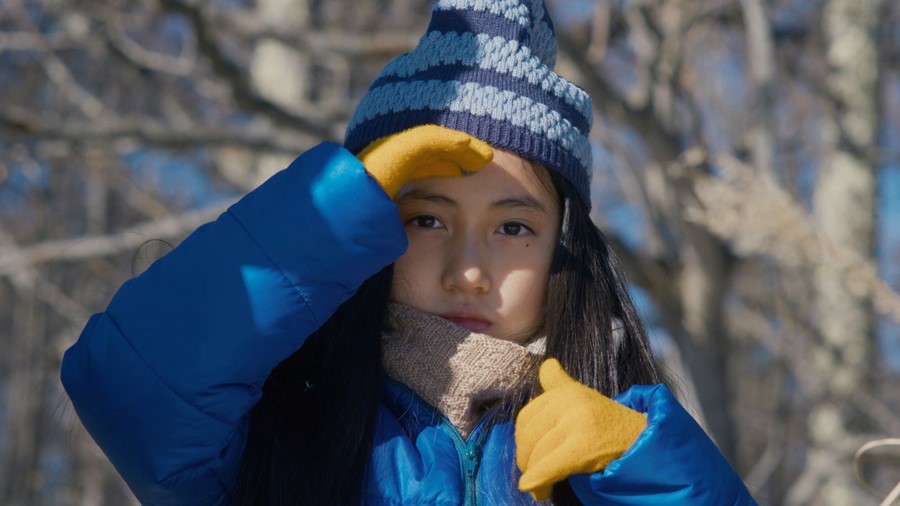At Venice Film Festival, the Japanese director talks about his first feature since Drive My Car, and why his films are meant to be “surprising and puzzling”
Is it mad to lavish praise on a film you don’t fully understand? Ryusuke Hamaguchi’s Evil Does Not Exist is the sort of film that leaves you bewitched, bothered and bewildered for days, ending on a note of rising panic that leaves our questions – and there are a lot – unanswered. “People have said they’re confused by the ending,” Hamaguchi tells me at Venice Film Festival, where the film is competing for this year’s Golden Lion. “Confusion is what I wanted.”
Longtime admirers of the Japanese director will know he has no truck with easy answers: his last film, the Academy award-winner Drive My Car, was a three-hour treatise on the basic unknowability of people. I don’t know if this film will have the zeitgeisty appeal of his hyped Murakami adaptation – it lacks the hot-and-heavy sex talk and games with language, for one – but for those attuned to his style, it’s a complete marvel. Perhaps an instructive comparison would be Céline Sciamma’s Petite Maman, a miniature masterpiece that finds resonance in a story so small it’s “barely even an incident”, as Hamaguchi himself acknowledges.

The drama, such as it is, concerns a Tokyo talent agency’s plans to install a glamping site in a rural community. The villagers are suspicious of the plans, suspecting they are being rushed through to secure post-pandemic funding and will prove damaging to the landscape. As a box-ticking exercise, the company dispatches two of its agents to the village for a consultation, in which things get hilariously frosty. The agents are powerless to do much, but it sparks thoughts in both about why they do what they do for a living, and dreams of escaping to the country. Hamaguchi was drawn to the idea of glamping, he says, because “it’s urbanites coming into nature and trying to conveniently choose what they want out of nature. And I felt that was a reflection of our society and [the way we live].”
If the drama is decidedly small-scale, the title is anything but, an audacious trick Hamaguchi used to create a “nervous tension” in the events of the film. “I want the title to help put forward a thought for people, because ultimately I don’t know whether evil exists or not,” he explains. “But I think it’s hard to say that it doesn’t exist after watching this film; I don’t think you can completely say so.”
To understand the nature of the evil being debated, we should first acknowledge the film’s intended form as a 30-minute, dialogue-free visual accompaniment to a live score written by Eiko Ishibashi, his collaborator on Drive My Car. Ishibashi sent some pieces of music to the director, who spent time in the rural community where the composer lives as part of the endeavour. “Eiko makes wonderful music and I thought that perhaps the music could lead me to somewhere new and different,” explains Hamaguchi, who says the project helped unburden him from the pressures of international acclaim brought by Drive My Car. “I felt that nature matched her music because it really doesn’t have a definition, and so I started thinking about nature and the way that movement works within it – the wind, the water, the trees, the light. All of these things harmonise very well with the kind of music that she makes.”

Hamaguchi, a lifelong city-slicker born in Tokyo’s Kawasaki district, found inspiration for his lead, taciturn single dad Takumi, in a local odd-jobs man who shared his intimate knowledge of the countryside with the director. (Takumi is played with closed-book intensity by a member of Hamaguchi’s production team, Hitoshi Omika.) On the other side of the debate are agents Takahashi and Mayuzumi, representing the encroaching threat of civilisation, so it’s perhaps a surprise to hear the director describe them as the figures he most closely identifies with in the film, as people who hadn’t previously felt any real connection to nature. “I think living in a city is about putting our trash outside and forcing it into the peripheries,” says Hamaguchi. “We live as if that can’t be helped, and yet we do it knowing there must be an end to this sometime. But we don’t do anything about it.”
To embody this conflict, Hamaguchi increasingly felt like he needed dialogue for his film, and so one project became two – Evil Does Not Exist and Gift, the wordless version of the story which will premiere in Belgium this October. The latter will, presumably, give fuller rein to Ishibashi’s extraordinarily moving score, which Hamaguchi treats abruptly in Evil Does Not Exist, frequently cutting it short in ways that disrupt the gentle reveries it inspires. “I haven’t always used much music in my filmmaking and that’s really because I believe that music has a strong power to appeal to people’s emotions,” says the director. “With this project I knew music was necessary, but I didn’t want to use it in a way to invite emotions, because it’s important for me to keep a good distance between the film and the audience.”
It’s a remark that speaks to Hamaguchi’s elusive approach to filmmaking, his poetic conviction that the stories which tie us up into knots of unknowing are the ones that linger longest. In Evil Does Not Exist, when the soft cadences of his film explode in a moment of violence, we feel the weight of his conviction most keenly. “You know, I personally am not sure whether I trust the audience or not,” says Hamaguchi. “For me cinema is a surprising thing – I myself am a [cinemagoer] and I love the idea of being surprised or puzzled by things. That, to me, is a very strong experience you can get from cinema: this hesitation, this wondering.”
